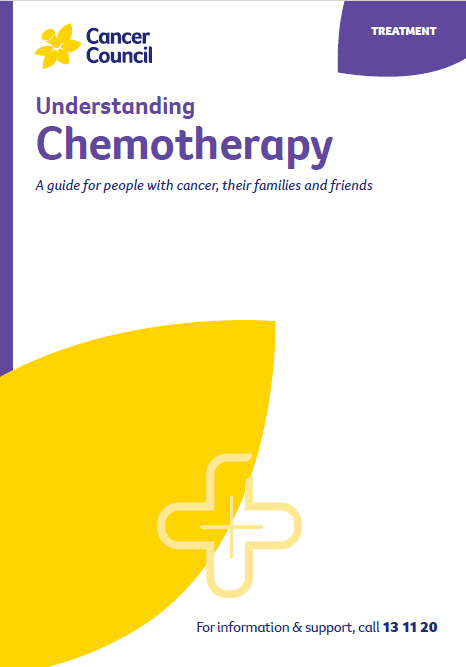- Home
- Cancer of unknown primary (CUP)
- Treatment
- Chemotherapy
Chemotherapy for CUP
Chemotherapy uses drugs to kill cancer cells or slow their growth. Medical oncologists and some other specialists prescribe chemotherapy to shrink a cancer and relieve symptoms. It can also be used together with radiation therapy or surgery to try to kill a collection of cancer cells in the body.
Learn more about:
- How chemotherapy is given
- Number of sessions
- Side effects of chemotherapy
- Video: What is chemotherapy?
How chemotherapy is given
Generally, chemotherapy is given through a drip inserted into a vein (intravenously), but some types are taken by mouth as tablets. As different cancer cells respond to different chemotherapy drugs, you may have a combination of drugs. It is common in CUP to receive 2 chemotherapy drugs.
Chemotherapy is commonly given as a period of treatment followed by a break. This is called a cycle. The length of the cycle depends on the drugs used. Usually, you will have chemotherapy during day visits to a hospital or treatment centre. Sometimes a short stay in hospital is needed.
Number of sessions
The total number of treatment cycles you have depends on your situation. With CUP, after 2 or 3 cycles you will usually have imaging scans to test how the cancer is responding to the drugs. The results will let you weigh up the benefits of continuing the treatment against the effects on your quality of life. It may also mean a change in treatment if the chemotherapy is not shrinking the cancer.
Side effects of chemotherapy
Most chemotherapy drugs cause side effects. Side effects are usually temporary, and can be prevented or reduced.
The most common side effects include:
- feeling sick (nausea)
- vomiting
- mouth sores
- tiredness
- loss of appetite
- diarrhoea or constipation
- some thinning or loss of hair from your body and head.
Chemotherapy weakens the body’s immune system, making it harder to fight infections. You will have regular blood tests to check your immune system. If your temperature rises to 38°C or above, contact your medical team or go to the nearest hospital emergency department immediately.
The side effects of some chemotherapy drugs can be longer lasting or permanent (e.g. damage to the heart or nerves). Ask your doctor to explain the potential risks and benefits of the chemotherapy recommended for you.
For more on this, see our general section on Chemotherapy.
It is important to tell your treatment team about any side effects you have from drug therapies. Side effects can be better managed when reported early. You may be given medicine to prevent or reduce side effects. Sometimes, your doctor may delay treatment or reduce the dose to lessen side effects.
You may be able to get other drugs to treat CUP through clinical trials. Ask your doctor about recent developments and whether a clinical trial may be an option for you.
→ READ MORE: Hormone therapy for CUP
Video: What is chemotherapy?
Watch this short video to learn more about chemotherapy.
Podcast: Making Treatment Decisions
Listen to more episodes from our podcast for people affected by cancer
More resources
Prof Chris Karapetis, Network Clinical Director (Cancer Services), Southern Adelaide Local Health Network, Head, Department of Medical Oncology, and Director, Clinical Research in Medical Oncology, Flinders Medical Centre and Flinders University, SA (Clinical review); Dr Amey Aurangabadkar, Radiologist, Illawarra Radiology Group, NSW; Clare Brophy, Consumer; Prof Katherine Clark, Clinical Director of Palliative Care, NSLHD Supportive and Palliative Care Network, Northern Sydney Cancer Centre, Royal North Shore Hospital, NSW; Prof Wendy Cooper, Senior Staff Specialist, Tissue Pathology and Diagnostic Oncology, NSW Health Pathology, Royal Prince Alfred Hospital, NSW; A/Prof Richard Gallagher, Head and Neck Surgeon, Director of Cancer Services and Head and Neck Cancer Services, St Vincent’s Health Network, NSW; Dr Chloe Georgiou, Oncology Research Fellow, Australian Rare Cancer Portal, and Oncology Trials Fellow, Bendigo Health Cancer Centre, VIC; Dr Susan Harden, Radiation Oncologist, Peter MacCallum Cancer Centre, VIC; Justin Hargreaves, Medical Oncology Nurse Practitioner, Bendigo Health Cancer Centre, VIC; Dr Laura Kirsten, Principal Clinical Psychologist, Nepean Cancer Care Centre, NSW; Prof Linda Mileshkin, Medical Oncologist, Peter MacCallum Cancer Centre, VIC; Caitriona Nienaber, 13 11 20 Consultant, Cancer Council WA.
View the Cancer Council NSW editorial policy.
View all publications or call 13 11 20 for free printed copies.

